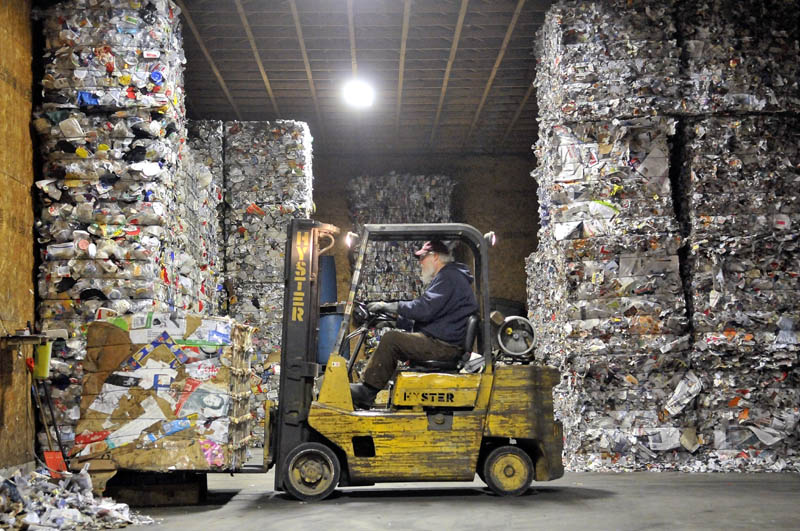FARMINGTON — Some central and western Maine towns will be facing a significant hike in recycling costs this year.
The Sandy River Recycling Association, which serves 18 towns, will be increasing its fees, in some cases doubling town recycling costs, because of a decrease in prices for recyclable materials along with a decline in area recycling and competition from the single-stream industry.
The association will be billing its members 31 percent more this year because operating costs last year were about $100,000 more than its revenue.
Three members have left the association in the last three years; and town officials from the largest member of the association, Farmington, recently discussed researching benefits and disadvantages of also switching to single-stream recycling.
Jo Josephson, president of the Sandy River Recycling Association board, said the association, in response to the declining revenue, decided at its most recent board meeting to research ways the association can be innovative and improve.
She said the group will be researching working with single-stream recycling and ways to increase their efficiency.
She said the group is hoping to unveil new plans in the upcoming months to the member towns.
In Farmington’s proposed 2013 budget, which will be voted on tonightmonday, the recycling budget is set to increase 35 percent to $14,816.
Selectman Andrew Hufnagel, who volunteered to research recycling options, said he attended the Sandy River board meeting at which its new direction was discussed. He said he plans to speak with companies that offer single-stream options and compare what he finds with any new options coming from Sandy River, then take the results of his research to the board for discussion.
In 2012 the association made $120,902 from the sale of recycled material, but operating costs for the year were $223,964. The association also spent $36,281 from reserve funds on the repairs and needed equipment.
Josephson said the association already has drained its reserve fund and laid off a part-time employee in an effort to offset the gap and keep prices down for member towns. The $20,000 in cuts have reducing the operating budget to $201,990, its lowest level since 2005.
This year, along with increasing the amount charged to towns from $57,308 to $75,000 to reflect the true cost of service, the association has adopted a trip fee that is proportional to the distance from the association’s headquarters in Farmington to a member’s transfer station.
The trip fee charged to the members for pickup will be between $30 and $110 per trip, depending on the length of the trip. Josephson said the charge is in response to higher gas prices, which make longer trips increasingly expensive.
For example, Josephson said this means Eustis, which is more than 50 miles from the recycling center, will pay a larger trip fee than Farmington, which has a recycling center directly across from Sandy River Recycling.
Josephson said the association’s financial problems began when the economy began to struggle in 2009 and the money it was paid for recycled materials declined, in some cases dramatically.
“You can go from $160 to $12 per ton for the same material. It’s all depends on supply and demand,” she said.
She said the association began to deplete its reserve money to keep prices low despite the decrease in revenue.
Also, in the last three years, three towns have left the association for single-stream recycling, which means residents can toss all recyclables into one bin at a recycling center instead of having to sort it.
Towns that have made the switch have reported a decrease in recycling costs and an increase in recycling.
Josephson said Kingfield, Mount Vernon and Wilton all made the switch and are no longer members of the association. She said after each town cancels its membership, the additional cost is divided among the remaining towns.
Josephson said the single-stream recycling centers, which were designed originally for urban centers, are slowly expanding into the more rural areas of Maine.
“They’re courting the towns and giving them great deals. We’re being challenged by competition, which is part of the American economy,” she said.
Josephson said she thinks Sandy River offers a higher-quality alternative to single-stream recycling by keeping material separate.
“They’ve got cat food cans in with the cardboard. The material is going to get contaminated,” she said.
The Sandy River Recycling Association began in 1990 in response to recycling legislation that was passed with the goal of increasing recycling to 25 percent of the state’s municipal solid waste by 1991 and 50 percent by 1994. Josephson said the state has doubled the amount it recycles since then.
To meet increasing recycling demands, Josephson said, the association was formed as nonprofit run by a volunteer board made up of representatives from its member towns. Today there are 18 member towns and plantations, and residents in the unorganized territories also use nearby members’ transfer stations. The association employs three full-time workers.
She said all decisions are made at board meetings by the volunteer members. She said while cuts affect the towns, they were agreed on by the towns through the board.
“We are owned by the towns and are very much a part of the community. We’re trying to do our best,” she said.
Kaitlin Schroeder— 861-9252
kschroeder@mainetoday.com
Send questions/comments to the editors.


